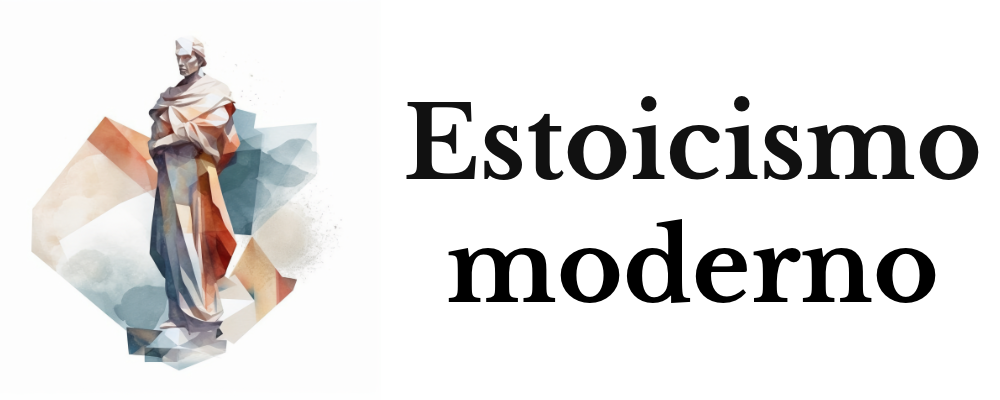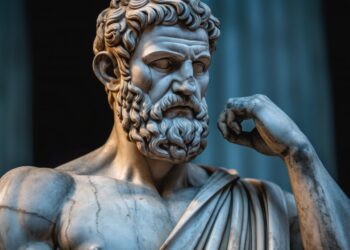The Abyss of Nihilism: Confronting the Absence of Meaning
In the depths of human existence, the dark flag of nihilism wafts, marking the confrontation with the abyss that is the absence of meaning. From where does purpose, a direction, arise when even the stars seem indifferent to our hustle? Herein, the ancient manuscripts of Stoicism glow like beacons in the storm, promising guidance and shelter. The Stoics, with their sparkling wisdom, still speak through the centuries, arming us for the battle against nothingness.
Reflections in Times of Crisis
Today, we face timeless dilemmas and contemporary challenges: climate change, inequality, pandemics. The ephemeral nature of daily headlines seems to feed a monster that whispers all is in vain. So, how might Zeno and Epictetus, with their papyri and scrolls, touch our modern souls?
“Some things are in our control and others not,” reminds us Epictetus’ Enchiridion, a fundamental distinction to begin our journey. Absolute control is a chimera, but in our hands lies the interpretation of events, the assignment of value, and, fundamentally, our response to them. This is not a cry into the void, but an echo of personal power. Self-determination does not deny external structures, but incites us to shape what we can: our character, our values, our actions.
The Din of Everyday Life
The current bombardment of information weaves a web of fatalism and apathy, anesthetizing mind and spirit. Marcus Aurelius, in his Meditations, offers a fitting mantra: “Do not let the future trouble you. You will meet it, if you have to, with the same weapons of reason which today arm you against the present.” The anxious anticipation of an uncertain tomorrow devours the present. Stoic wisdom invites us to focus on the here and now, empowering us as the wheel of the world keeps spinning.
The Eternal Dilemma of Authenticity
In the contemporary labyrinth of identities and displays, authenticity becomes an elusive object of desire. The Stoics teach us that virtue lies in the coherence between thought, word, and deed. Seneca, in his Letters to Lucilius, proclaims: “It is not that we have so little time, but that we lose so much.” Life slips through our fingers while screens glow with other people’s lives. It is essential to unravel our own values, appraise our time, and forge an authentic existence.
The Art of Ataraxia
The emotional turbulence of life often feels like a tide dragging us into an ocean of despair. But the Stoics raise a concept that tackles such disquiet: ataraxia, or imperturbability. It is not insensitivity or rejection of feeling but understanding and control of passions so as not to be slaves to them. Serenity does not exclude passion; it contains and channels it with an educated will.
Facing Nihilism
When nihilism threatens to swallow us, asking, “What’s the point if everything is fleeting?”, the Stoics urge us to look inward. “It’s not the sounds of the unknown that frighten and perplex us, but our imagination,” illustrates Epictetus. Despair is a mirage of judgment, a misuse of our faculty to assign meaning.
Stoic Techniques for the 21st Century
In everyday life, Stoic practices translate into tangible habits:
- Contemplation of Nature: Observing nature facilitates understanding of our lives as part of a larger order.
- Morning Reflection: Start the day considering how to live according to our values in the upcoming activities.
- Meditation Festina Lente: Act with “hasten slowly”, weighing each decision carefully without paralysis by analysis.
- Gratitude and Progress Journal: Noting daily achievements and reasons for gratitude reinforces the perception of meaning in our lives.
- Preparation Practice or Premeditatio Malorum: Imagining adverse scenarios to lessen anxiety and strengthen our spirit for real trials.
Meaning and Action
The Stoic standard does not promise an external, predestined sense but intimates that each of us must forge it. Self-realization lies in virtuous action, in pursuing character excellence, and in contributing to the community. A meaning is woven in the canvas of our daily choices, in the artisanship of our existence.
Conclusions as Bastions against the Void
And so, standing before the apparent void, the Stoics extend to us a robust hand. With virtue, ataraxia, and conscious action, the absence of meaning dissolves, revealing that purpose has always been in the substance of our lives, in the soul of being-doing. The abyss becomes a space to build bridges with our highest capacities.
“The happiness of your life depends upon the quality of your thoughts,” muses Marcus Aurelius, and in this lies the challenge and the promise. Faced with the abyss of nihilism, confront it with the heart of a Stoic: confront the silence with meaningful action, shape the void with virtue, and trust that, at the end of the day, what is truly yours cannot be taken by the maelstrom of the indifferent cosmos. The invitation is to inscribe on the marble of the mundane and the transcendent, the signature of your deliberate and courageous existence.









